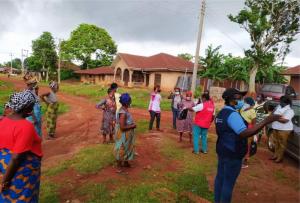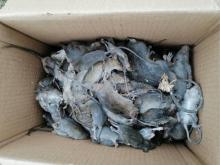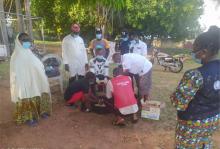Stakeholders shore up sensitization campaign to curb Lassa fever outbreak in Edo state
Benin City, 24 February 2021 - Things have changed for the better in Jattu town of Edo State, says Osumah Kassim Inusa, a community leader in the area. Since health officials implemented a robust community sensitisation and vector control project in 2020, there has been a significant reduction in the numbers of Lassa fever infections recorded.
“Usually at this time of the year, at least one person in a household would have contracted the disease, but it is different this year”, confirms the leader of Jattu, a town located within Edo State’s Etsako West Local Government Area (L.G.A). “On behalf of Jattu community, we are happy with the enlightenment campaigns. It has changed how many of our people preserve their food and interact with society and the rats killing exercise has also brought the death rate from Lassa fever to its barest minimum.”
Lassa Fever is a hemorrhagic viral disease transmitted by a vector called multimammate rat that can fatally affect the kidney, spleen or liver. Edo State has in the past recorded high cases of the disease, leading the state to revive tools and strategies to combat it.
With increasingly complex health challenges, community engagement has been found to be a powerful public health tool to advocate behavioural change. Therefore, the Edo State Government with support from the World Health Organization (WHO) State Office and partners conducted sensitization campaigns last year to enlighten Edo residents on the importance of keeping their food and the environment free of rodents.
In addition to that, WHO also implemented a vector control project in homes and drainages around the communities.
Vector control
Faith Ireye, WHO Edo State Coordinator, said the vector control (deratization) programme has shown that prevention is vital in eliminating Lassa fever outbreaks in Nigeria.
“As the WHO State Coordinator, I have supported Edo in coordinating Lassa fever surveillance and contact tracing from 2018 to date. I have seen cases increase yearly despite all intervention in place. After an in-depth analysis conducted in March 2020 showed that the high burden was from specific settlements, we decided to change tactics and focus on vector control.”
The vector control project by WHO was implemented from March till December 2020 in three phases. The project covered 9 LGAs and 127 settlements across the state. Almost one-third (29.9%) of harvested rodents, Mrs Ireye found, were multimammate rats.
Presenting data on the success, Mrs Ireye says there is a noticeable decline in cases reported this year as at epidemiological week six (6) by 64% and 77% respectively when compared to the same period in the last two consecutive years. Neighbouring states, she adds, have expressed interest in the Edo State’s progress report so that they can adapt the state’s vector control strategy.
Highlighting the notable impact from the engagements, Nafissa Ikerodah, the Disease Surveillance and Notification Officer (DSNO) of Etsako West LGA says the sensitization campaigns have been yielding positive outcomes as she has more time to focus on the surveillance of other diseases.
“My Local Government Area (Etsako West) usually reports the highest number of Lassa Fever cases in Nigeria. To combat the problem, WHO and partners supported the mass sensitization campaigns in the settlements across the LGA. They advocated and supported communities with a high burden in the mass elimination of rats using rodenticides, and this has been yielding positive results. There has been a drop in the number of cases reported from my LGA in the last six months.
“Community sensitization and vector control is working. Communities are seeing the result and importance and are taking ownership of the program.”
Preparedness is key
Applauding the proactive measures in preventing an outbreak of the disease in 2021, the state epidemiologist Dr Uwa Okhuarobo has commended WHO’s leadership in tackling the virus in the state.
He says data available at the state’s disposal shows that Edo state is on the right path towards eliminating the disease by getting rid of the vector.
So far, epidemiological data from Edo state as of week 6 of 2021 shows that the state has recorded (470) suspected cases and (39) confirmed cases including (4) deaths from the disease. As of the same period in 2020, a total of (690) suspected cases with (167) confirmed cases and (7) deaths were reported in the state.
“I can confidently say we are winning the war against Lassa fever in Edo state,” Dr Okhuarobo adds. “We must not lose focus on our public health intervention through vector control to sustain the gains recorded so far.”
Technical Contacts:
Dr Famiyesin Ekundare; Email: famiyesinw [at] who.int (famiyesinw[at]who[dot]int); +234 705 801 6273
Dr Faith Ireye; Email: ireyef [at] who.int (ireyef[at]who[dot]int); Tel: +234 803 583 5529





